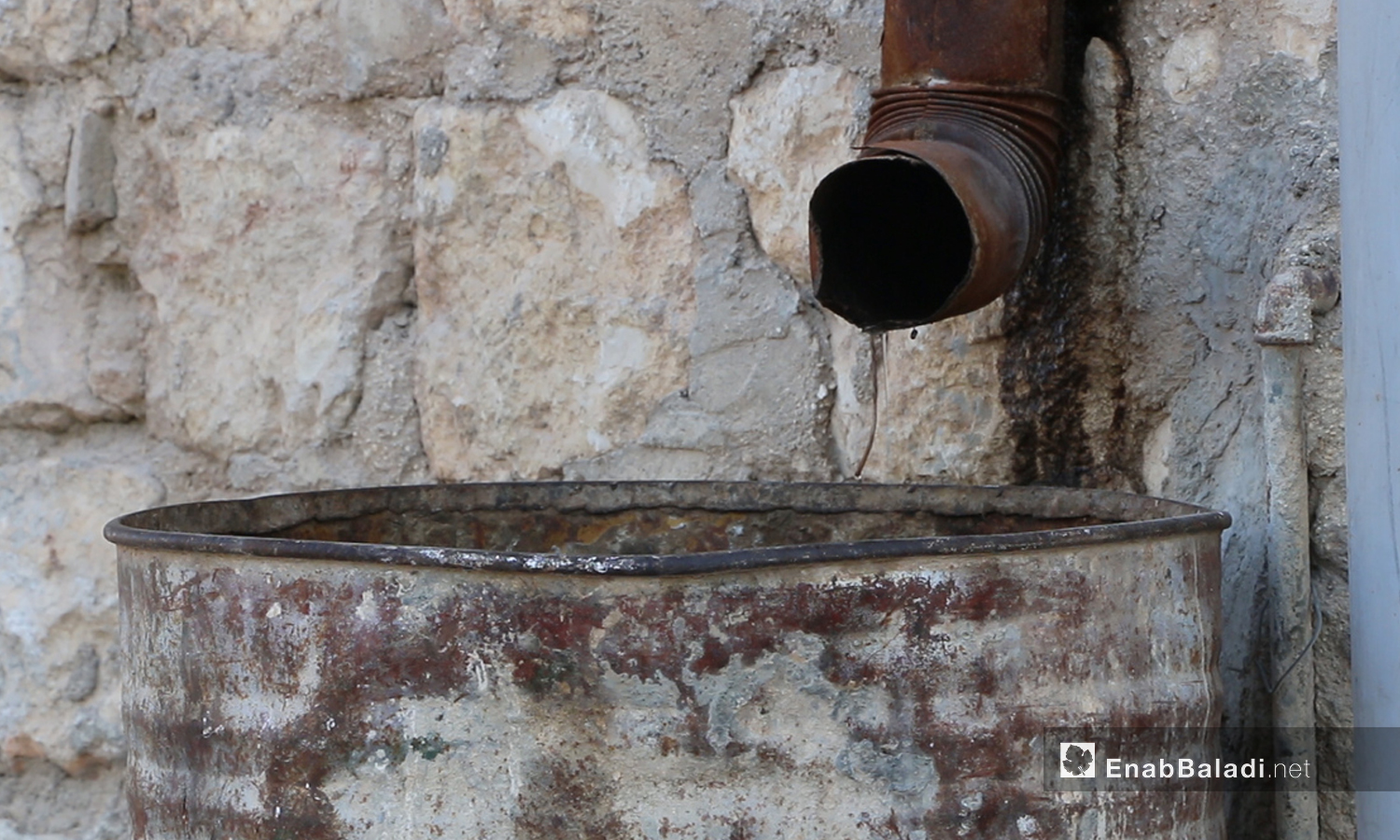



Enab Baladi – Idilb countryside
In Kurin, a village in the town of Ariha and administratively part of the Idlib province, people cannot remember when the flow of water was cut off from the water supply network to their homes.
“It is about ten years since we did not see water,” said the forty-year-old man, Abdul Jabbar Ajina with a yellow smile on his face.
In an interview with a program broadcast on Enab Baladi’s social media platforms called “What’s Your Problem?,” Ajina said that the residents of Kurin have to get water via water tank trucks, which constitutes an additional financial burden, referring to the high costs of catering water.
30 barrels, the capacity of the tank that the villagers have to register their names and wait to receive their allocation every month and a half after paying 50 Turkish Liras (TL- around 5.8 USD), to get “insufficient” amounts of water.
Water rationing has become a way of life in Kurin. The residents have followed different ways to save water; they clean the dishes with pieces of cloth and reuse bathwater, or ablution water for cleaning the floor and irrigating the crops, according to a survey conducted by Enab Baladi.
Damaged infrastructure due to military operations is widespread throughout Syria, as the war in Syria has entered its tenth year. However, the residents of Kurin do not think that there is a water crisis in the area, pointing to water well in the village. Plus, they do not know about the problem of the broken water pipelines network.
The relief organizations do not give the village enough attention, at some point, they are marginalizing it, according to Abu al-Nasr.
He added that his hope to see the water pumped again in the pipes of the water supply network lasted for nearly two years, yet, with no results.
Engineer Jamal Diban, the general manager of Kurin’s water supply network told Enab Baladi the problem encountered in providing the network with water does not stop when “minor” disruptions are fixed. Actually, the problem can end when water bills are paid.
He said “We failed to collect water bills. People always complain that water does not reach their homes […]. So, the network is not activated.”
“The blame” goes to the high cost of extracting and delivering water according to Diban, who pointed out that the well in Kurin is deep, and the cost of extracting one cubic meter reaches four and a half TL (0.5 USD). With the costs of water transportation, the total cost, in the end, is five TL (0.6) per cubic meter. Nonetheless, the company “supports” the residents by demanding them to pay only three TL (0.3) per cubic meter.
The residents of Kurin get an access to water from two sources: People can get water from the public sector after registering their names and waiting for their turn to get one tank of healthy water on which all safety measures are applied,” according to Diban. They also can get water from the private sector, where peole cannot be sure if water is clean or safe enough to drink. Furthermore, most people of the village cannot afford it.
Diban indicated that he is waiting for the olive harvest to end, so that the local council can collect the cost of buying a solar energy pumping device form the people, “which will reduce the cost of extracting water.” Besides, he said that the water company presented to the humanitarian organizations a full study of the situation in the village, waiting for a response for its demands.
The United Nations Office for the Coordination of Humanitarian Affairs (OCHA) reported that more than 370,000 people in northwestern Syria are in need for an access to water and sanitation services, at an estimated cost of nine million US dollars.
According to the ”REACH” initiative evaluation, the costs of transporting water in northwestern Syria increased by 2 percent between August and September and by 80 perecent compared to last March. That percentage in Ariha was 41 percent between August and September and the same applies to March.
if you think the article contain wrong information or you have additional details Send Correction